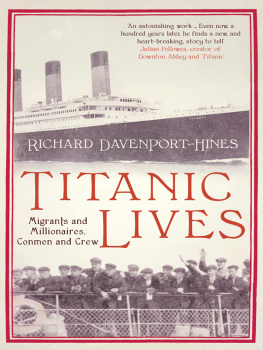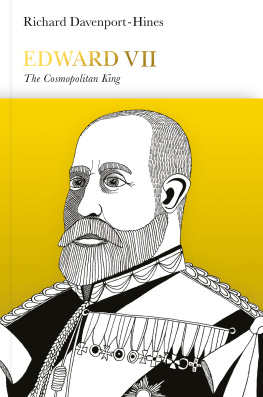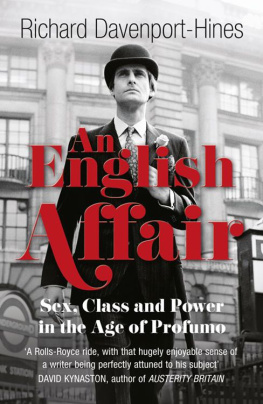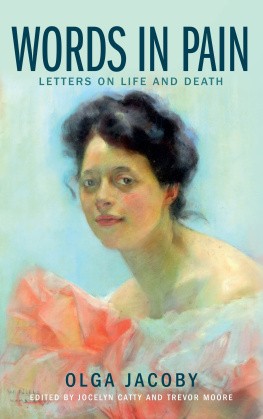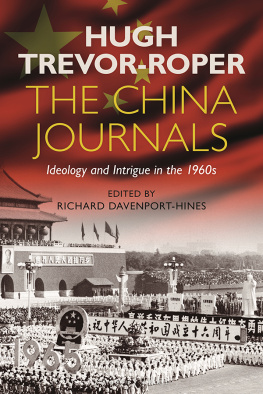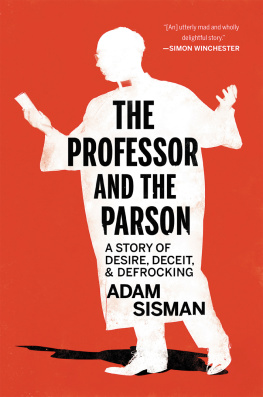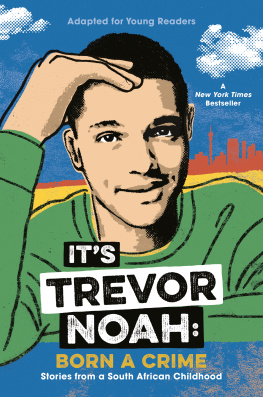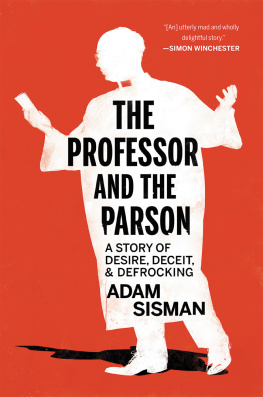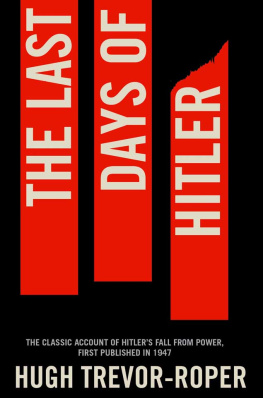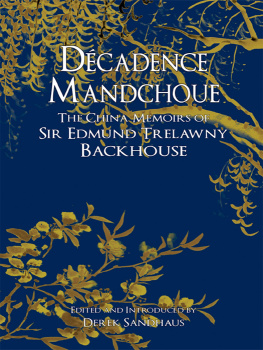ONE HUNDRED LETTERS
FROM HUGH TREVOR-ROPER
HUGH TREVOR-ROPER
One Hundred Letters from
edited by
Richard Davenport-Hines and Adam Sisman



Great Clarendon Street, Oxford, OX2 6DP,
United Kingdom
Oxford University Press is a department of the University of Oxford.
It furthers the Universitys objective of excellence in research, scholarship, and education by publishing worldwide. Oxford is a registered trade mark of Oxford University Press in the UK and in certain other countries
The Literary Estate of Lord Dacre of Glanton 2014
Introduction, selection, editing, and notes
Richard Davenport-Hines and Adam Sisman 2014
The moral rights of the authors have been asserted
First Edition published in 2014
Impression: 1
All rights reserved. No part of this publication may be reproduced, stored in a retrieval system, or transmitted, in any form or by any means, without the prior permission in writing of Oxford University Press, or as expressly permitted by law, by licence or under terms agreed with the appropriate reprographics rights organization. Enquiries concerning reproduction outside the scope of the above should be sent to the Rights Department, Oxford University Press, at the address above
You must not circulate this work in any other form and you must impose this same condition on any acquirer
Published in the United States of America by Oxford University Press
198 Madison Avenue, New York, NY 10016, United States of America
British Library Cataloguing in Publication Data
Data available
Library of Congress Control Number: 2013947868
ISBN 9780198703112
Printed in Italy by
L.E.G.O. S.p.A.Lavis TN
ACKNOWLEDGEMENTS
Our paramount debt, one beyond measure, is to Blair Worden, Hugh Trevor-Ropers literary executor, who encouraged us to undertake this book, and who has given us far more help in the preparation and revision of it than the editors could expect or adequately thank.
Judith Curthoys, the Christ Church archivist, who has charge of the Dacre papers, has been a wonder of patience and efficiency throughout our work. Rodney Allan has translated, identified, and glossed passages from Greek and Latin, and has done sterling work in correcting the transcription of documents. We are profoundly grateful to both of them.
We are also grateful to Jeremy Cater, Jeremy Catto, Edward Chaney, Frank Giles, the late Earl Haig, Sir Michael Howard, James Howard-Johnston, Alan Macfarlane, Peter Miller, Alasdair Palmer, Richard Rhodes, Zeev Sternhell, the Hon. James Stourton, Geoffrey Wheatcroft, and Blair Worden, who supplied us with letters and consented to their publication.
We thank those who have given permission to reproduce letters to their relations: the Hon. Deborah Blake (to her father Lord Blake); Susan Chater and William Stuart (their father Charles Stuart); Jane Clark (her husband Alan Clark); Alastair Hamilton (his father Hamish Hamilton); Alexandra Henderson (her father Sir Nicholas Henderson); Sarah Holds-worth (her mother Valerie Pearl); Mary Lefkowitz (her husband Hugh Lloyd-Jones); Robin and Vivien Perutz (their father Max Perutz); and Helen Szamuely (her father Tibor Szamuely). Oliver Ramsbotham has kindly allowed us to quote correspondence between his father, Sir Peter Ramsbotham, and Trevor-Roper.
Other debts of gratitude are to the Beinecke Library at Yale, for the letters to Wallace Notestein; the Library of Kings College, Cambridge, for the letters to Nol Annan; the Harry Ransom Center at the University of Texas at Austin, for the letters to Gerald Brenan; Claudia Wedepohl, archivist of the Warburg Institute, for consent to reproduce letters to Frances Yates; Henry Hardy and the Isaiah Berlin Trust; the Brotherton Library, Leeds (Special Collections), for the letter to Lord Boyle of Handsworth; the Wellcome Library, for the letter dated 24 February 1973 to Sir Peter Medawar (PP/PBM/D/12); Gertrude Himmelfarb for permission to quote a letter by her of 25 August 1965; Anthony Thwaite for supplying and allowing us to quote a letter to him of 3 September 1976; and the Syndics of Cambridge University Library, for permission to publish an extract from a letter to J. H. Plumb. The quotation from Sir Isaiah Berlin on p. xii is from Henry Hardy and Mark Pottle (eds.), Isaiah Berlin, Building: Letters 19601975 (Chatto & Windus 2013), pp. 845 Isaiah Berlin Literary Trust.
Many amendments were made after Henry Woudhuysens invaluable scrutiny of the typescript. Numerous other individuals have helpfully answered queries or volunteered information, among them John Adamson, Jeremy Cater, Jeremy Catto, Edward Chaney, Xenia Dennen, Gavin Fuller, Timothy Garton Ash, Mark Greengrass, Miriam Gross, Henry Hardy, Edward Harrison, James Howard-Johnston, Lord Kennet, Paulina Kewes, Mary Lefkowitz, John Maddicott, Peter Miller, John Morgan, Jan Morris, Alasdair Palmer, Philip Pattenden (who has taken particular trouble in answering questions about Cambridge), Christopher Phipps, Richard Rhodes, Norman Stone, James Stourton, Gina Thomas, William Thomas, Geoffrey Wheatcroft, David Wootton, and Brian Young. We are grateful to them all.
CONTENTS
LIST OF ILLUSTRATIONS
.
Plates
.
You understand the nature of history better than any of your contemporaries in England, and I dare say in Europe, and there is no reason for concealing this fact.
Sir Isaiah Berlin to Hugh Trevor-Roper, 6 March 1962
These hundred letters, a selection from the many thousands that Hugh Trevor-Roper composed, were written over fifty-eight years, from September 1943, when he was 29 years old, to December 2001, when he was 87 and had thirteen months to live. The first letter was written in his period as an intelligence officer, who found in correspondence, and in the solitary meditations that were published in 2011 as The Wartime Journals, forms of self-expression that were excluded by the secrecy and mechanical preoccupations of his work. When he wrote the last of his letters he was living alone, widowed, almost blind, and mortally ill, in a Victorian rectory in the town of Didcot in south Oxfordshire. This volume traverses a career in academic life which roamed far beyond it. A Tutor in History at Oxford from 1946, he became Regius Professor of Modern History in 1957; was ennobled in 1979 as Lord Dacre of Glanton; and moved to Cambridge in 1980 as Master of Peterhouse, an office he held for seven years until his retirement. Seventeen of the letters are written from his Oxford college, home, or office; eleven from the Masters Lodge at Peterhouse; seventeen others during his many travels. The letters describe visits to Greece, to Spain, to Portugal, to Iceland, to Israel, to the United States, to the West Indies, to Australia, to Pakistan, to Soviet Russia, to Czechoslovakia.
His vitality, which was indomitable in both his historical work and his extra-curricular diversions, is evident throughout these hundred letters selected for publication at the time of the centenary of his birth. Our selection illustrates the range of his life and preoccupations: as a historian, a controversialist, a public intellectual, a legislator, a lover of literature, a traveller, a countryman. It depicts a life of rich diversity in public activities and private avocations; a mind of intellectual sparkle and eager curiosity; a character that relished the comedies of his time, and revelled in the absurdities, crotchets, and vanities of his contemporaries. It reveals the complexities of an exceptional personality. And it will gladden readers who value wit, erudition, and intellectual vigour. The playful irony of his correspondence places him in a literary tradition which stretches back to the correspondence of Madame de Svign in the seventeenth century and Horace Walpole in the eighteenth. Like them he takes pleasure in enlightening and amusing his correspondents. Like them he has a vivid power of pictorial imagery. Yet in a letter of 7 March 1959 we find Trevor-Roper wearying of the superficiality of de Svigns correspondence. His power of analysis brings something more searching. He, no less than they, is an aesthete, but his aestheticism is combined with fierceness of intellect, with an inexhaustible curiosity of enquiry, and with a passion for lucid analysis.
Next page

